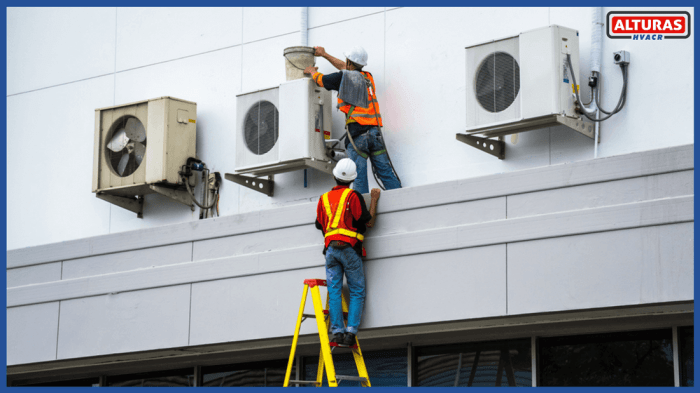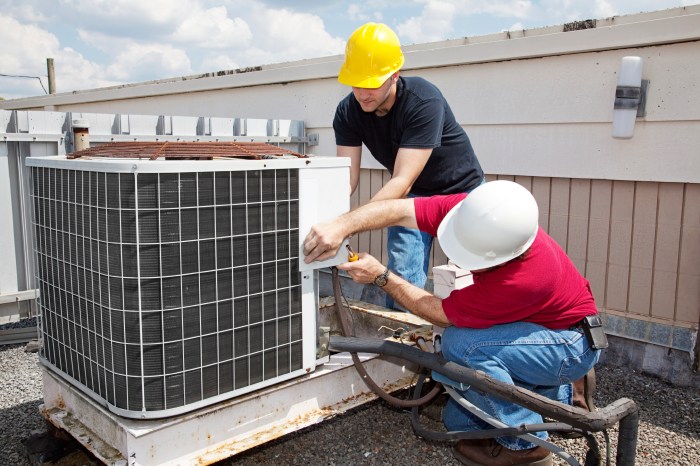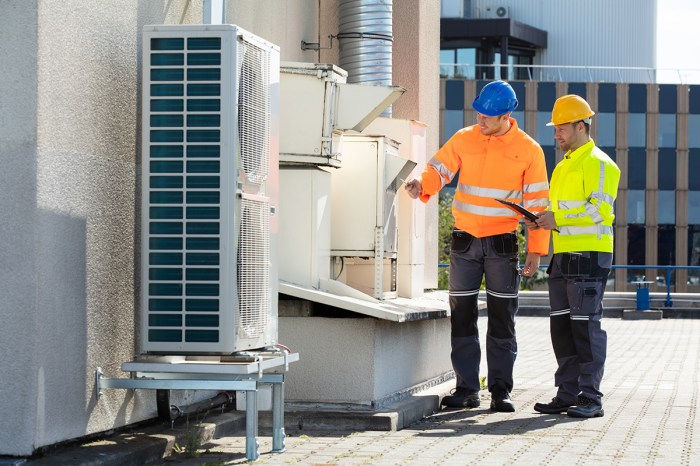Optimizing Commercial Air Conditioner Repair Services for Maximum Efficiency
Exploring the realm of commercial air conditioner repair unveils a crucial aspect of maintaining a comfortable and productive business environment. From routine maintenance to intricate repairs, the world of commercial air conditioning systems is both complex and rewarding.
As businesses rely heavily on these systems for efficient operations, understanding the nuances of repair processes and cost considerations becomes paramount. Let's delve deeper into the realm of commercial air conditioner repair to uncover essential insights and best practices.
Overview of Commercial Air Conditioner Repair

Regular maintenance is crucial for ensuring the optimal performance and longevity of commercial air conditioning systems. Without proper upkeep, these systems can experience a range of issues that may require repairs, leading to costly downtime and discomfort for occupants. Professional repair services offer the expertise and resources needed to address these issues effectively, providing a reliable solution compared to DIY attempts.
Importance of Regular Maintenance
- Prevents breakdowns and costly repairs
- Ensures energy efficiency
- Improves air quality and comfort
- Extends the lifespan of the system
Common Issues Requiring Repair
- Refrigerant leaks
- Compressor failures
- Frozen coils
- Electrical issues
- Poor airflow
Benefits of Professional Repair Services
- Expertise in diagnosing and fixing complex issues
- Access to specialized tools and equipment
- Compliance with safety regulations
- Guaranteed workmanship and warranties
Troubleshooting Commercial Air Conditioner Problems
When your commercial air conditioner is not functioning properly, it can lead to discomfort for employees and customers. Timely troubleshooting can help identify and address common issues before they escalate.
Insufficient Cooling
- Check the thermostat settings to ensure they are correct for the desired temperature.
- Inspect the air filters for dirt or clogs that may be restricting airflow.
- Examine the condenser unit outside to see if it is obstructed by debris or vegetation.
- Verify that the ductwork is properly sealed and insulated to prevent air leaks.
- If these steps do not resolve the issue, it may be a sign of a refrigerant leak or compressor malfunction, requiring professional repair.
Strange Noises
- Listen for any unusual sounds coming from the air conditioner, such as banging, grinding, or rattling noises.
- Tighten loose components, such as screws or bolts, that may be causing vibrations or rattling noises.
- Clean the fan blades and motor to remove any debris that could be causing unusual sounds during operation.
- If the noises persist, it could indicate a more serious issue with the motor or compressor that needs professional attention.
Identifying the Need for Professional Repair
- If you are unable to troubleshoot the issue on your own or if the problem persists after attempting basic troubleshooting steps, it is time to call a professional HVAC technician.
- Professional repair services have the expertise and tools to diagnose and fix complex air conditioner problems effectively.
- Ignoring the need for professional repairs can lead to further damage to the system, resulting in costly repairs or even premature replacement.
Significance of Timely Repairs
- Addressing air conditioner issues promptly can prevent disruptions to your business operations and ensure a comfortable environment for employees and customers.
- Timely repairs can also help extend the lifespan of your commercial air conditioner and improve its overall efficiency.
- Regular maintenance and timely repairs can save you money in the long run by avoiding major breakdowns and costly replacements.
Commercial Air Conditioner Repair Process
When it comes to repairing commercial air conditioning systems, there are several key steps that technicians follow to ensure the system is up and running efficiently. Let's explore the typical repair process, tools and equipment required, and important safety precautions that technicians should always keep in mind.
Repair Process Steps
- 1. Diagnosis: The first step in repairing a commercial air conditioner is to accurately diagnose the issue. This involves inspecting the system, checking for any visible damages, and running diagnostic tests to pinpoint the problem.
- 2. Parts Replacement: Once the issue has been identified, the technician will replace any faulty parts or components. This may include replacing filters, belts, coils, or other components that are causing the problem.
- 3. System Testing: After replacing the necessary parts, the technician will test the system to ensure that the repairs were successful. This may involve running the air conditioner and checking for proper cooling and airflow.
- 4. Maintenance: Finally, the technician may recommend regular maintenance to prevent future issues and keep the commercial air conditioner running smoothly.
Tools and Equipment
- 1. Multimeter: Used for measuring voltage, current, and resistance to diagnose electrical issues.
- 2. Refrigerant Gauges: Essential for checking and adjusting refrigerant levels in the system.
- 3. Vacuum Pump: Used for removing air and moisture from the system during repairs.
- 4. Screwdrivers, Wrenches, and Pliers: Basic tools for removing and replacing components in the air conditioning system.
Safety Precautions
- 1. Turn Off Power: Before starting any repairs, technicians should always disconnect the power supply to the air conditioning system to prevent electrical accidents.
- 2. Use Personal Protective Equipment (PPE): Technicians should wear gloves, safety goggles, and other protective gear to prevent injuries during repairs.
- 3. Proper Ventilation: Ensure that the work area is well-ventilated to prevent exposure to harmful fumes or refrigerants.
- 4. Follow Manufacturer Guidelines: Always refer to the manufacturer's instructions and guidelines when conducting repairs to ensure safety and proper procedures.
Cost Considerations for Commercial Air Conditioner Repair

When it comes to repairing a commercial air conditioner, there are several factors that can influence the overall cost. Understanding these factors can help businesses make informed decisions about whether to repair or replace their units. Additionally, budgeting for unexpected repair expenses can help prevent financial strain down the line.
Factors Influencing Repair Costs
- The extent of the damage or problem: The more severe the issue, the higher the repair cost is likely to be.
- The type and age of the air conditioning unit: Older units or units with specialized features may require more expensive parts or labor.
- The availability of replacement parts: If the parts needed for the repair are rare or discontinued, it can drive up the cost.
- The location and accessibility of the unit: Units in hard-to-reach places may require more time and effort to repair, increasing the overall cost.
Repair vs. Replacement Costs
- Repairing a commercial air conditioner is often more cost-effective than replacing the entire unit, especially if the problem is fixable and the unit is not too old.
- Replacing a commercial air conditioning unit can be significantly more expensive, as it involves purchasing a new unit, installation costs, and potential modifications to existing ductwork or electrical systems.
- Businesses should weigh the upfront cost of repair against the long-term savings of a more efficient, reliable unit to make the best decision for their budget.
Tips for Budgeting for Repair Expenses
- Set aside a portion of your budget each year for maintenance and repairs to avoid being caught off guard by unexpected expenses.
- Work with a reputable HVAC provider to establish a maintenance plan that can help prevent costly repairs through regular inspections and tune-ups.
- Consider investing in energy-efficient units that may qualify for tax incentives or rebates, helping offset repair or replacement costs in the long run.
Conclusion

In conclusion, commercial air conditioner repair is not just about fixing a malfunctioning unit—it's about ensuring the longevity and optimal performance of a crucial asset in any commercial setting. By prioritizing regular maintenance, timely repairs, and professional services, businesses can mitigate costly disruptions and maintain a conducive indoor environment.
Stay informed, stay proactive, and reap the benefits of a well-maintained commercial air conditioning system.
Essential Questionnaire
What are the benefits of professional repair services over DIY solutions?
Professional repair services offer expertise, efficiency, and warranty guarantees that DIY solutions often lack. By hiring professionals, businesses can ensure thorough repairs and long-term reliability for their commercial air conditioning systems.
How can businesses budget for unexpected repair expenses?
Setting aside a contingency fund specifically for air conditioner repairs can help businesses navigate unexpected expenses without disrupting their operations. Additionally, exploring maintenance contracts with service providers can offer cost-effective solutions for routine upkeep and potential repairs.
What safety precautions should technicians follow during the repair process?
Technicians should always adhere to safety protocols such as wearing protective gear, ensuring proper ventilation in work areas, and following manufacturer guidelines for handling equipment and refrigerants. Prioritizing safety not only protects the technicians but also maintains the integrity of the repair process.




